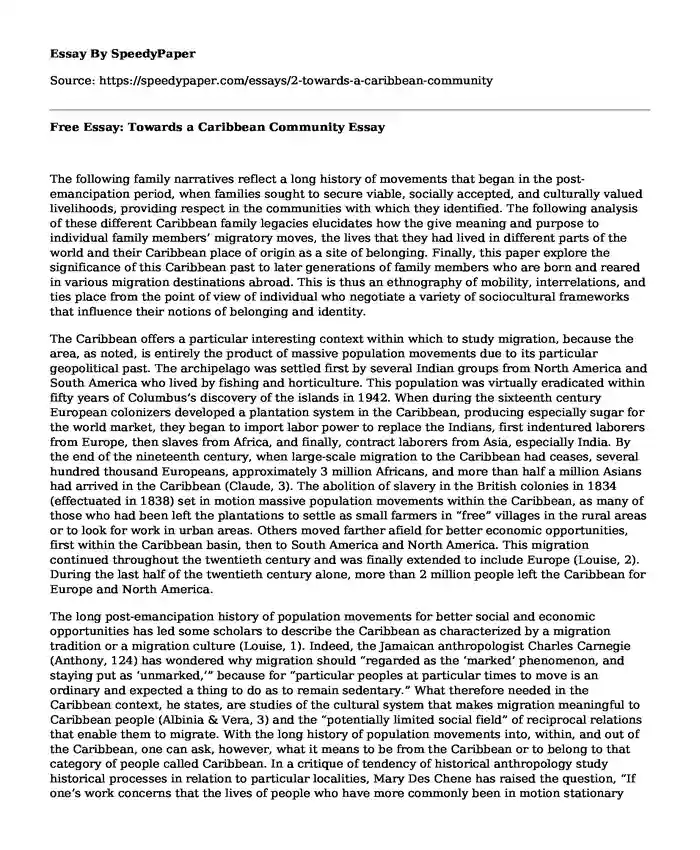The following family narratives reflect a long history of movements that began in the post-emancipation period, when families sought to secure viable, socially accepted, and culturally valued livelihoods, providing respect in the communities with which they identified. The following analysis of these different Caribbean family legacies elucidates how the give meaning and purpose to individual family members’ migratory moves, the lives that they had lived in different parts of the world and their Caribbean place of origin as a site of belonging. Finally, this paper explore the significance of this Caribbean past to later generations of family members who are born and reared in various migration destinations abroad. This is thus an ethnography of mobility, interrelations, and ties place from the point of view of individual who negotiate a variety of sociocultural frameworks that influence their notions of belonging and identity.
The Caribbean offers a particular interesting context within which to study migration, because the area, as noted, is entirely the product of massive population movements due to its particular geopolitical past. The archipelago was settled first by several Indian groups from North America and South America who lived by fishing and horticulture. This population was virtually eradicated within fifty years of Columbus’s discovery of the islands in 1942. When during the sixteenth century European colonizers developed a plantation system in the Caribbean, producing especially sugar for the world market, they began to import labor power to replace the Indians, first indentured laborers from Europe, then slaves from Africa, and finally, contract laborers from Asia, especially India. By the end of the nineteenth century, when large-scale migration to the Caribbean had ceases, several hundred thousand Europeans, approximately 3 million Africans, and more than half a million Asians had arrived in the Caribbean (Claude, 3). The abolition of slavery in the British colonies in 1834 (effectuated in 1838) set in motion massive population movements within the Caribbean, as many of those who had been left the plantations to settle as small farmers in “free” villages in the rural areas or to look for work in urban areas. Others moved farther afield for better economic opportunities, first within the Caribbean basin, then to South America and North America. This migration continued throughout the twentieth century and was finally extended to include Europe (Louise, 2). During the last half of the twentieth century alone, more than 2 million people left the Caribbean for Europe and North America.
The long post-emancipation history of population movements for better social and economic opportunities has led some scholars to describe the Caribbean as characterized by a migration tradition or a migration culture (Louise, 1). Indeed, the Jamaican anthropologist Charles Carnegie (Anthony, 124) has wondered why migration should “regarded as the ‘marked’ phenomenon, and staying put as ‘unmarked,’” because for “particular peoples at particular times to move is an ordinary and expected a thing to do as to remain sedentary.” What therefore needed in the Caribbean context, he states, are studies of the cultural system that makes migration meaningful to Caribbean people (Albinia & Vera, 3) and the “potentially limited social field” of reciprocal relations that enable them to migrate. With the long history of population movements into, within, and out of the Caribbean, one can ask, however, what it means to be from the Caribbean or to belong to that category of people called Caribbean. In a critique of tendency of historical anthropology study historical processes in relation to particular localities, Mary Des Chene has raised the question, “If one’s work concerns that the lives of people who have more commonly been in motion stationary refugees, migrant workers, colonial district officers, academics, and what makes the place where one happens to catch up with them in itself revelatory of that mobility and its means?” One might paraphrase this question slightly and ask, “If one’s work concerns the lives of people who have a long history of movements, what makes the mobility and its meanings?” To address this question, it is necessary to examine how this place has been invested with social and cultural meaning and how variously positioned people have done rights.
In conclusion this article has focused and explained in detail how most of the narratives of most families reflect a long history of movements that began in the post-emancipation period, when families sought to secure viable, socially accepted, and culturally valued livelihoods, providing respect in the communities with which they identified as to be part of them. The paper explores reasons why the Caribbean offers a particular context in which one can easily study migration due to its geopolitical past. Finally it ends by notifying why some scholars identifying Caribbean as being characterized by migration traditions or migration culture.
Bibliography
Anthony P. Maingot, Wilfredo Lozano. The United States and the Caribbean. 1994.
Bennett, Louise. Anancy Stories and Poems in Dialect. Kingston, Ja: Printed by the Gleanor Co, 1944. Print.
Ramesh, Kotti S, and Kandula N. Rani. Claude Mckay: The Literary Identity from Jamaica to Harlem and Beyond. Jefferson, N.C. [u.a.: McFarland & Co, 2006. Print
Cite this page
Free Essay: Towards a Caribbean Community. (2017, Oct 26). Retrieved from https://speedypaper.net/essays/2-towards-a-caribbean-community
Request Removal
If you are the original author of this essay and no longer wish to have it published on the SpeedyPaper website, please click below to request its removal:
- Free Essay Sample on Steroid Use in Sports
- Free Essay Sample on Teenage Pregnancies
- Art Essay Example: The Card Player by Paul Cezanne (Painting)
- Free Essay on Human Resources in Hotels
- Adolescent Interview - Free Essay in Psychology
- Global Forces and Advertising Industry, Free Essay
- Free Essay on Travelling Concepts
Popular categories





